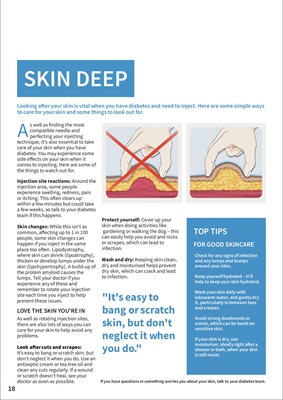
18 SKIN DEEP
Looking after your skin is vital when you have diabetes and need to inject. Here are some simple ways
to care for your skin and some things to look out for.
s well as finding the most
compatible needle and
perfecting your injecting
technique, it's also essential to take
care of your skin when you have
diabetes. You may experience some
side effects on your skin when it
comes to injecting. Here are some of
the things to watch out for.
Injection site reactions: Around the
injection area, some people
experience swelling, redness, pain
or itching. This often clears up
within a few minutes but could take
a few weeks, so talk to your diabetes
team if this happens.
Skin changes: While this isn't as
common, affecting up to 1 in 100
people, some skin changes can
happen if you inject in the same
place too often. Lipodystrophy,
where skin can shrink (lipoatrophy),
thicken or develop lumps under the
skin (lipohypertrophy). A build-up of
the protein amyloid causes the
lumps. Tell your doctor if you
experience any of these and
remember to rotate your injection
site each time you inject to help
prevent these issues.
As well as rotating injection sites,
there are also lots of ways you can
care for your skin to help avoid any
problems.
Look aft er cuts and scrapes:
It's easy to bang or scratch skin, but
don't neglect it when you do. Use an
antiseptic cream or tea tree oil and
clean any cuts regularly. If a wound
or scratch doesn't heal, see your
doctor as soon as possible.
LOVE THE SKIN YOU'RE IN
Protect yourself: Cover up your
skin when doing activities like
gardening or walking the dog - this
can easily help you avoid and nicks
or scrapes, which can lead to
infection.
Wash and dry: Keeping skin clean,
dry and moisturised helps prevent
dry skin, which can crack and lead
to infection.
FOR GOOD SKINCARE
Check for any signs of infection
and any lumps and bumps
around your sites.
Keep yourself hydrated - it'll
help to keep your skin hydrated.
Wash your skin daily with
lukewarm water, and gently dry
it, particularly in between toes
and creases.
Avoid strong deodorants or
scents, which can be harsh on
sensitive skin.
If your skin is dry, use
moisturiser, ideally right after a
shower or bath, when your skin
is still moist.
If you have questions or something worries you about your skin, talk to your diabetes team.
A
TOP TIPS
" It's easy to
bang or scratch
skin, but don't
neglect it when
you do."